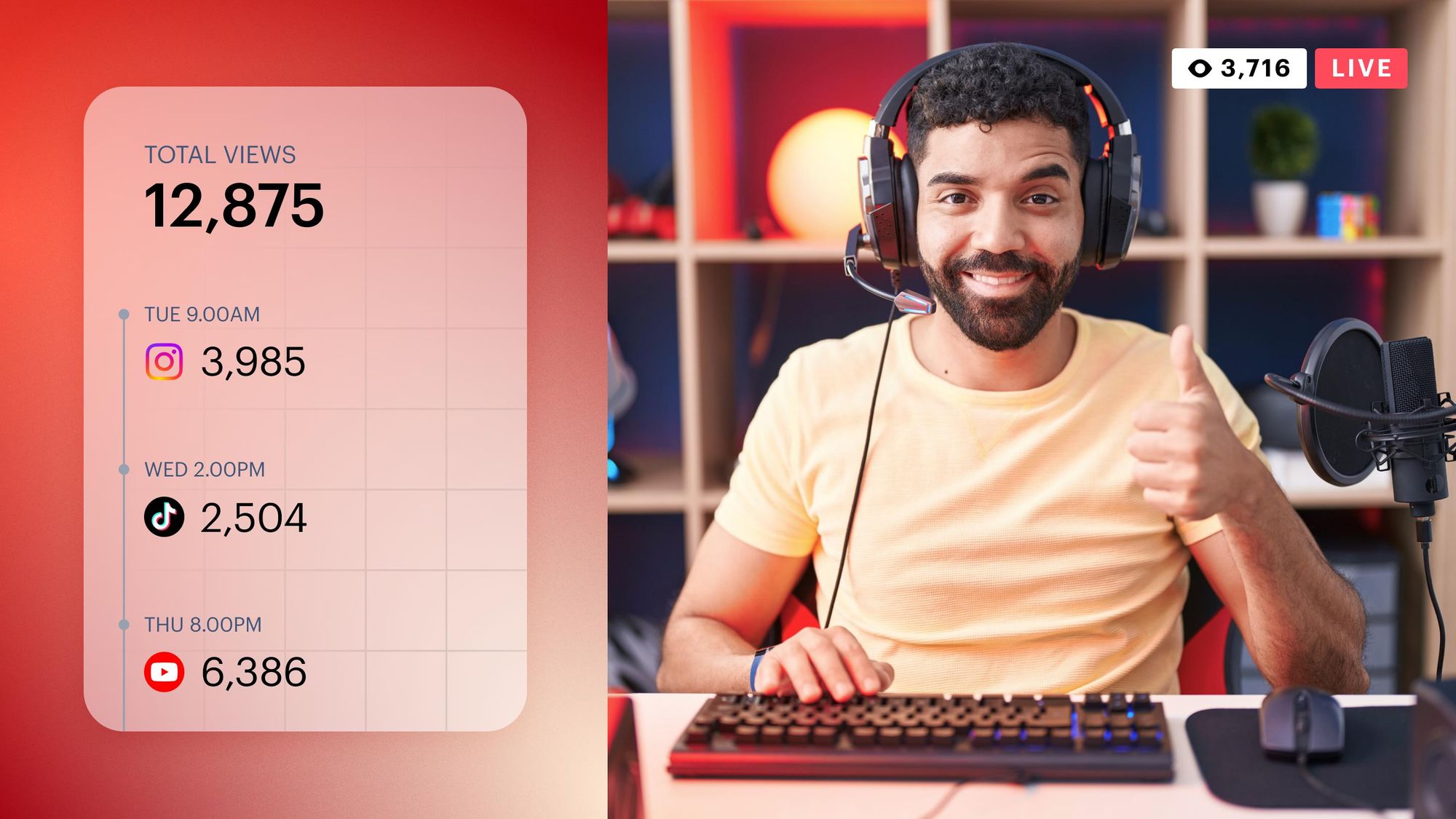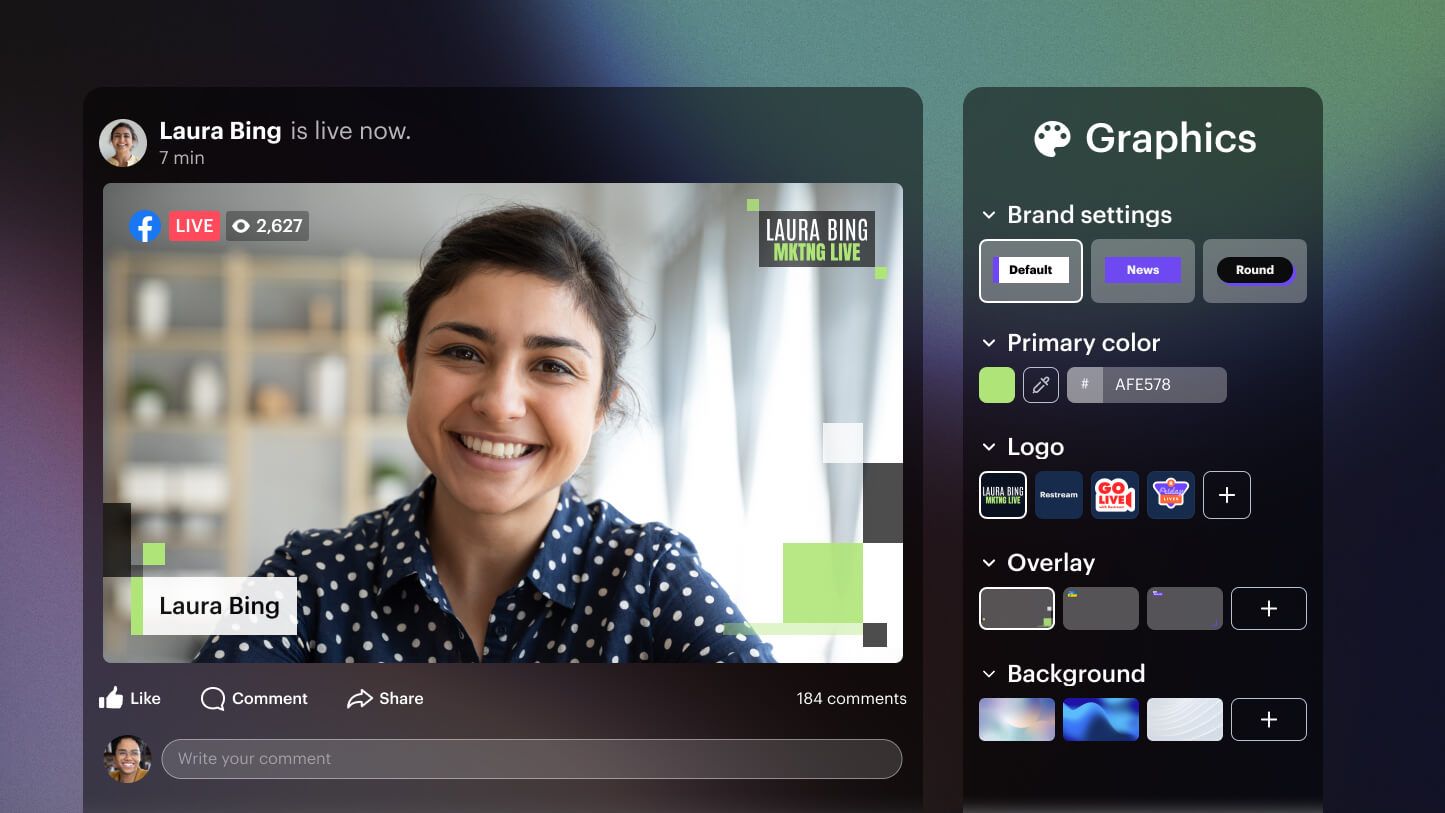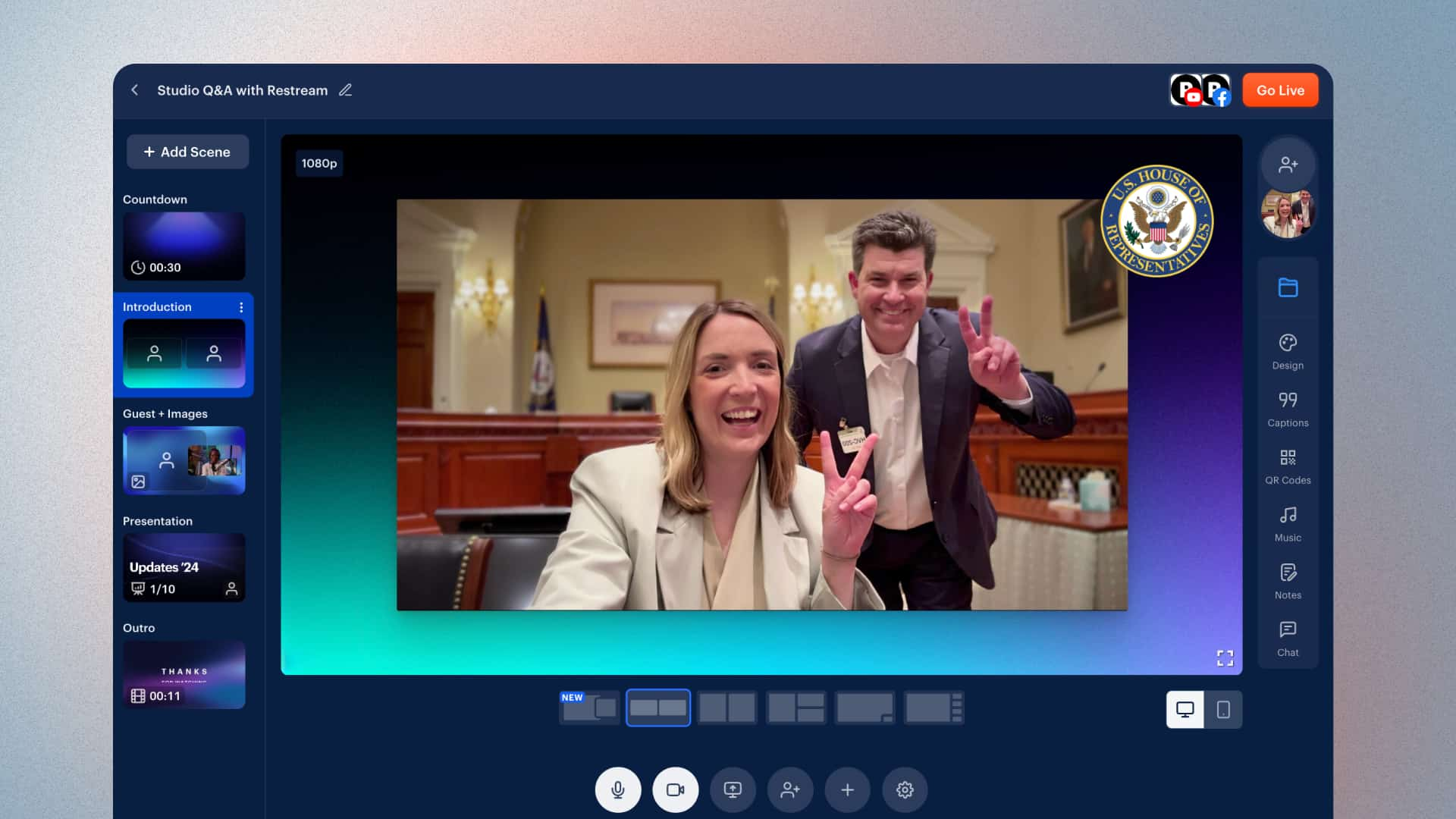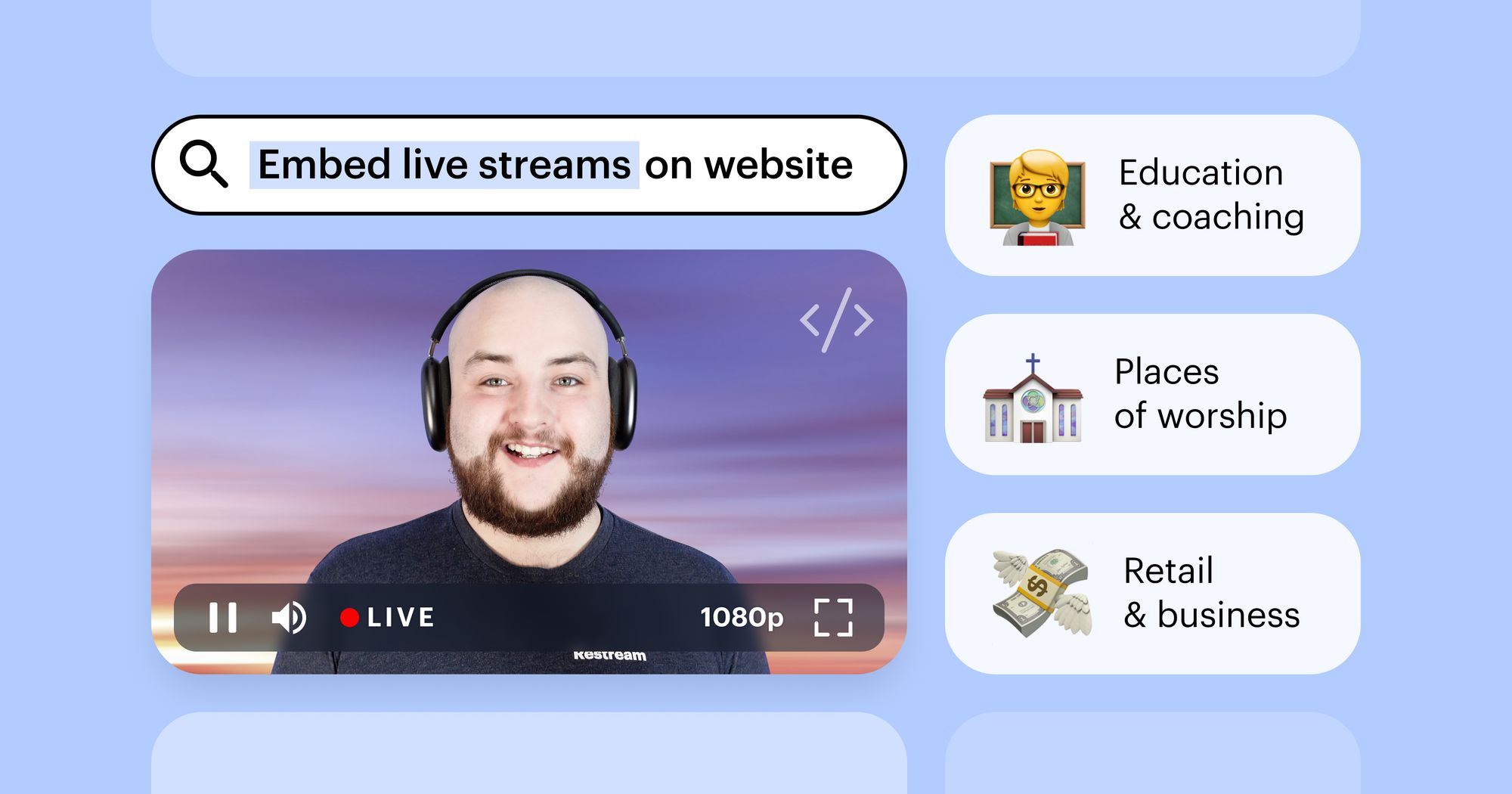Have you ever watched your favorite streamers playing video games and chatting with fans — and making tons of money doing so — and thought, “I could do that too!” You wouldn’t be the first. Thousands of people start live streaming on platforms like Twitch, YouTube, Instagram, and Facebook every day, many of them with the hope of becoming professional streamers.
Top streamers make it look easy, though. Turning pro as a live streamer takes a lot more work than sitting in front of a computer, talking to fans, and playing games. If you want to learn how to become a successful streamer, you need to know what a day in the life of a full-time streamer actually looks like.
Is being a live streamer a viable career?
When you see popular streamers commanding audiences in the tens of thousands, or streamers landing huge sponsorship deals and raking in the cash, it’s easy to imagine yourself doing the same. While it’s possible to become a successful streamer and make a living with it, you’re unlikely to achieve the revenue and popularity levels of the world’s top streamers.
There are 8.07 million active streamers on Twitch alone, and the platform sees 107,800 live broadcasts at any given time. There are so many broadcasters on Twitch, YouTube, Facebook, and other live platforms, and most of them have no or very few viewers. You have to compete with all these streamers if you want to attract viewers, and it isn’t easy. Building a following takes time — years, even — and a lot of work outside of streaming.
But if you’re willing to put in the work, or you already have an audience on another platform that will follow you, you can eventually turn live streaming into a full-time job.
What does a professional streamer do all day?
If you’re interested in becoming a full-time streamer, you should know what an average day in the life of a streamer looks like. What do streamers do when they’re not broadcasting?
Professional live streamers are people who broadcast live videos of themselves over the internet to an online audience. Most streamers play video games, but others simply chat with viewers or showcase a hobby like painting or cooking.
Streamers also interact with and entertain viewers, bringing personality to their broadcasts. For streamers who play popular video games like Fortnite and League of Legends, having a unique personality is key to standing out among all the other streamers who play those same games.
What makes a streamer professional?
Since anyone can start broadcasting themselves live, for free, on a variety of platforms, you might wonder what distinguishes the amateur streamers from the professional ones. Full-time streamers are those who earn a living from their live streaming, and there are various ways to make money as a streamer.
For creators who have made a career out of streaming, the parts of their days when they aren’t live are dedicated to promoting their channels, connecting with other streamers, and countless other tasks. They usually create content for social media networks in addition to their live streams. The most successful Twitch streamers also try to establish a presence on YouTube, which requires hours of video editing and postproduction.
Bedsides sitting in front of a camera, professional live streamers may also take part in the following activities on any given day:
- Networking with fans, other streamers, and potential sponsors
- Editing content for YouTube
- Doing research for new streams
- Maintaining equipment (camera, PC, mic, etc.)
- Analyzing past streams to look for ways to improve
- Developing artwork/graphics for streams, videos, or social media content
Additionally, professional streamers who are self-employed and don’t have other jobs are running their own businesses. They have business tasks to take care of on top of all the content creation, marketing, networking, and other things they have to do as full-time streamers.
Can you make a living with live streaming?
Yes, you can make a living with live streaming, but it’s not easy. If you’re starting completely from scratch, it might take years before you can call yourself a professional streamer. A full-time streamer salary can vary greatly, depending on followers, donations, how often you stream, and other activities you engage in to supplement revenue you earn from the streaming platform.
Platforms like Twitch and YouTube have features that allow live content creators to monetize their streams. Keep in mind that most platforms limit monetization options to streamers who have some kind of following. On Twitch, you need at least 50 followers to use the Bits and Subscription features.
Average full-time streamer salary
Influencer Marketing Hub did a value estimation of the top channels on Twitch to determine how much they’re worth, based on views and subscribers. According to their calculations, the top three highest-paid Twitch streamers in 2021 were Ninja at $25 million, PewDiePie at $20 million, and Shroud at $12 million. These are the top streamers on Twitch, however, so you shouldn’t expect to make nearly this much in your first year of live streaming.
The Business of Apps estimates that the average monthly earnings for a streamer on Twitch who broadcasts about 40 hours per week is between $3,000 and $5,000. That figure doesn’t include Twitch ad revenue, a perk currently only available to Twitch Partners and Affiliates.
Streamer Facts also compiled a list of estimated earnings for streamers on Twitch, suggesting that a streamer with ten average viewers can make about $50 per month, while 100 viewers can earn you about $1,500 per month. According to their numbers, if you want to bring in closer to $5,000 per month, you need 1,000 viewers on average.
On LolFinity, the revenue estimates for Twitch streamers are much lower. According to their numbers, streamers with 100 viewers should only expect $100 or less per month. Those with up to 1,000 viewers can earn between $50 and $300 per month, while fewer than 10,000 viewers only gets you $1,000 per month.
As you can see from the above sources, trying to pin down an average salary for live streamers isn’t easy. It’s highly dependent on several factors, including how often you plan to stream. Many of these numbers are based on anecdotal evidence, including reports from individual streamers about how much they make. All of these sources use Twitch to evaluate live streamer salaries, leaving out potential revenue from other platforms like YouTube — which is ironic, considering that the most successful streamers don’t rely on Twitch alone to make all of their money.
When determining whether you can make enough money from streaming to live off of, remember that if you do this full-time, you’ll be self-employed. You’ll have to pay taxes on the money you earn from streaming, and you’ll have to calculate those taxes yourself.
Most full-time streamers started broadcasting as a hobby, on a more part-time basis. They were only able to turn pro and quit their day jobs after they had spent some time building an audience. If you want to be a professional streamer as well, you should consider taking the same route.
Additional monetization options
Content creators who earn a full-time streamer salary aren’t relying solely on monetization options from the platform to generate income. They also engage in some of the following activities:
- Setting up donations on a third-party platform like Patreon
- Affiliate marketing
- Brand sponsorships
- Selling custom merchandise
High-earning streamers rely on more than one revenue stream to make up their salaries. If you want to make it as a full-time streamer, you need to be prepared to juggle all these revenue streams as well.
Is it worth it to become a live streamer?
Streaming full-time can be an extremely rewarding career, especially if you love interacting with new people. If you genuinely enjoy live streaming, all the hard work that goes into it won’t seem so bad. Like any career or hobby, there are pros and cons to streaming. Ultimately, it’s up to you to decide if it’s worth it.
Pros of being a live streamer
- Meet new people
- Develop good speaking and presentation skills
- Improve research and creative thinking skills
- Learn about content creation and marketing
- Gain location independence and stream from anywhere
- A ton of information is online to help you get started
- No certifications or qualifications are required
- Be your own boss
Cons of being a live streamer
- Requires a lot of working hours to make decent money
- Being live constantly can be draining
- Almost no job security
- Self-employment means no benefits or insurance
- Inability to grow if you aren’t good at networking
- Need a powerful PC to stream video games
- Become a target for criticism
How to become a successful live streamer
Your success as a live streamer will depend on several important factors:
- Streaming goals: Before you start your streaming journey, set some goals. Ask yourself why you want to go live and what needs to happen for you to consider it a success.
- Niche: Figure out what will make your channel unique. With millions of other streamers to choose from, why should viewers watch you? As you consider your live streaming niche, remember that you don’t have to stick to gaming. Focus on what you like or won’t mind doing over and over again.
- Personality: Your personality is a big part of why viewers show up. Whether you’re funny, friendly, clever, or energetic, try to be engaging and open to your viewers.
- High-quality content: The bar is high for live streaming content these days. Viewers won’t stick around if you have poor audio or image quality, or if the connection keeps dropping and interrupting your stream. Ensure you have the proper internet upload speeds for streaming, and get a decent webcam and mic to produce a stream worth watching.
- Complying with ethics: If there’s anything that can end your streaming career before it starts, it’s breaking the rules of your streaming platform. Read the terms of service before you start broadcasting so you don’t get a nasty surprise later. Also, be careful about how you present yourself when you’re live. Foul, hateful language and opinions will ruin your streaming reputation and prevent you from pursuing the career you dreamed of.
- Consistency: You can’t build an audience if you’re not consistent. Try to stream regularly, at the same times of day or on the same days of the week. Your audience will know when to expect you.
- Avoiding burnout: Live streaming can easily take up all of your time, leaving you with only enough free time to sleep and eat. It’s important to maintain a healthy work-life balance, especially when you’re self-employed. To keep your stream schedule consistent even when you’re on a vacation, try pre-recording and scheduling your stream in advance with Restream events.
Interviews with famous live streamers
Get a better sense of what daily life is like for professional live streamers by reading and watching interviews with streamers themselves!
Pierre “FraeslarN” Johansson:
Have fun and enjoy yourself
Pierre “FraeslarN” Johansson is a Swedish variety streamer on Twitch who streams for several hours each day, five or six days per week. He started with no following at all and had saved up some money so he could start streaming full-time and still support himself. His biggest tip for new streamers is to have fun and enjoy yourself because then viewers will enjoy themselves too.
Tyler “Ninja” Blevins:
I just want to stay levelheaded and keep getting bigger
Tyler “Ninja” Blevins is one of the most well-known streamers today. His career began as a pro gamer playing Halo 3, and he first started attracting attention as a streamer for his Fortnite gameplay in 2017. He has over 17 million followers on Twitch, making him number one on the platform as of December 2021. In an interview with ESPN, he says he wants to bring professional gaming and streaming up to the same level as traditional sports and entertainment, and that he works to be a role model for younger gamers.
Matt “Mizkif” Rinaudo:
I eat, sleep, and breathe Twitch
Matt “Mizkif” Rinaudo is an American streamer with over 700,000 followers on Twitch and over 90,000 followers on YouTube. To be a full-time streamer, he says it takes “nonstop work and dedication.” He says to never stop moving and work hard every day on your streaming career. One piece of advice from Rinaudo is to have a friend watch one of your first streams so you can go from zero viewers to one, as that makes a big difference.
“Leif”:
It was nice to feel like I was able to help people
“Leif” formerly known as “Bamyleaf” is a British gaming streamer and artist with over 9,000 followers on Twitch. At the time of this interview, in 2018, they streamed five to six hours per day, Monday through Friday. Keeping a work-life balance was a struggle for Leif, who used to work and stream all day, every day until stepping back a bit. Their advice for new streamers who are scared to start is to just jump in! Also, start networking with other streamers early on.
Maro “SprEEEzy” Miličević:
You always learn something new with each deal
Maro “SprEEEzy” Miličević is a full-time streamer and YouTuber living in Croatia. He mostly streams PUBG but has ventured into other games and IRL streaming as well. He has almost 92,000 followers on Twitch and 154,000 on YouTube. He was able to attract viewers when he first started by hitting leaderboards in PUBG and has developed his audience since then. One piece of advice he has for streamers looking to make deals with brands is to always make sure the brand’s message fits your channel and your philosophy.
“Hannahxxrose:”
It can be tough being a creator because of the hate you have to deal with
Hannah, a.k.a. Hannahxxrose, is a Minecraft streamer who made a name for herself streaming BedWars content on TikTok. She started out posting Minecraft gameplay videos on YouTube but has gradually shifted her audience to Twitch and TikTok, where she has 1.2 million and 2.7 million followers, respectively. Her advice for dealing with trolls as a content creator is to ignore them completely and have a zero-tolerance policy for hatred on your channel.
Kathleen “Loserfruit” Belsten:
Higher-ups and brands aren’t used to gaming, so they are not sure where to spend their budgets
Kathleen “Loserfruit” Belsten is an Australian gaming streamer with a fan base spread across Twitch, YouTube, TikTok, and Instagram. Besten got her start by filling a gap in the market; at the time, there weren’t many female or Aussie streamers. Today, she has 2.7 million followers on Twitch — she’s the second-most-followed female streamer on Twitch, after Pokimane. When talking about her revenue, she mentions that it comes from quite a few places, which makes her feel more secure.
Films about the daily lives of live streamers
To catch a glimpse of what being a streamer is really like, check out these short films and documentaries that follow streamers in their daily lives.
- Living the Stream: This documentary features several streamers who talk about online gaming, Twitch, and making money as a streamer.
- Inside the Daily Life of a Live Streaming Star in China | Op-Docs: In this New York Times short documentary, a film crew follows a Chinese streamer as she broadcasts to millions of viewers every night and earns thousands of dollars each month.
- Streamers: This web series follows streamer Will as he reflects on four years of streaming on Twitch. He talks about building a community on the platform and learning how to monetize live streams.
- The People’s Republic of Desire: This documentary looks at the Chinese social networking platform YY, where live streamers broadcast content every day and fans send them thousands of dollars in virtual gifts.
Wrapping up
Being a streamer may not be all it’s cracked up to be. You have to really love what you do and maintain the motivation to keep going. If you have that — and you’re willing to commit serious hours to networking, promotion, research, editing, and content planning in addition to broadcasting live — then you may just turn yourself into a professional streamer.







